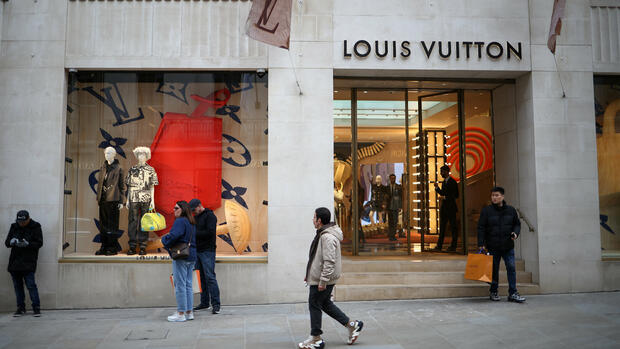More and more people spend money on the luxury products of the LVMH group.
(Photo: Reuters)
More and more money can be made with champagne and fine handbags. This has made Bernard Arnault the currently richest man in the world. The fortune of the boss of the French luxury brand empire LVMH was estimated at 158 billion dollars in 2022. In doing so, he outstripped tech entrepreneurs Jeff Bezos and Elon Musk.
When Mercedes announced its business figures for last year in February, CEO Ola Källenius not only announced one of the best results in the company’s history, but also that the average price per vehicle sold rose from 51,000 euros in 2019 to almost 73,000 euros last year .
A year ago, Mercedes had announced the end of the A-Class. Mercedes wants to position itself as a luxury brand.
Do the two examples stand for something more general? Are we witnessing a gentrification of the economy, a transition to an economy that primarily serves the wealthy?
Premium corporate strategies are not new. They are attractive because the profit margins in the high-end market are higher than in the mass-market. Today, however, these strategies are expanding. Why?
The economy is being gentrified
The supply chains that have been disrupted since the pandemic, which repeatedly make the preliminary products scarce, and the lack of workers provide an indication. When all of the demand cannot be met, companies focus on producing the products that promise them the highest profit. But there is also a deeper reason for the gentrification of the economy.
During the last few decades, the upper social strata have been able to increase their income and wealth considerably. In contrast, the growth in income among the lower social classes was low and only the upper half of society had significant assets anyway, according to a study by the German Economic Institute.
So there is a shift in purchasing power towards the wealthy. This changes the market. Because if you have a lot of money, you won’t buy twice as much sparkling wine from now on, but switch to champagne. And when buying a car, wealthy people want more exclusivity from Daimler.
But this “red carpet strategy” comes at a cost to society. On the one hand, consumers with less purchasing power no longer find their needs satisfied by what is on offer on the market. Long delivery times have to be accepted when purchasing a mass-produced vehicle. In economy class, the seats are getting closer together to make room for the beds further forward.
On the other hand, the life experiences between the courted people at the top and the rest are different. Those who sit in the front of the plane have no idea how cramped it is at the back. The luxury strategies of the corporations thus contribute to the polarization of society.
More: Is vacation now only for high earners?
